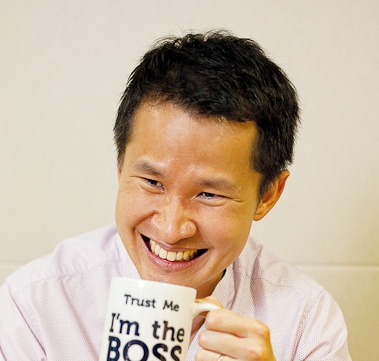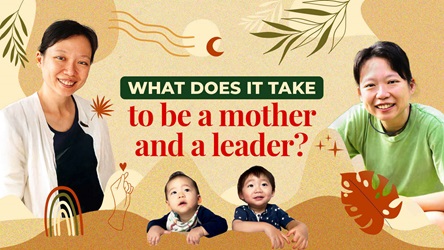"Sometimes Public Officers take Themselves too Seriously."

Lionel Yeo is the kind of affable chap you could happily shoot the breeze with on first meeting.
The trim, youthful Dean and CEO of the Civil Service College – the training arm for Singapore’s public officers – and Deputy Secretary (Development) of the Public Service Division regales with delightful, revealing anecdotes about life, his wife, art, trekking and work.
The accidental public officer
As a teenager, he harboured dreams of becoming an ad agency creative director or lawyer. But his biggest wish was to study overseas and a government scholarship was what reeled him into public service.
“The PSC (Public Service Commission) was first to make me an offer and I accepted. Otherwise, I didn’t know very much about public service,” says the London School of Economics alumnus.
Fifteen years later, Mr Yeo, 38 – who served in the Ministries of Trade and Industry (MTI), Finance, Information and the Arts (MITA), and Community Development, Youth and Sports (MCYS) – is still around, earning “psychic income” (non-monetary income that gratifies psychological and emotional needs) by working with great people. “Also, I do get a kick out of doing good for Singapore.”
Trekking diplomacy
At MTI, he led the Singapore delegation in negotiating a free trade agreement with New Zealand, Chile and Brunei.
Chief Chilean negotiator Ricardo Lagos Jr, son of the then Chilean President, found out that Mr Yeo is an avid trekker who has hit the trails in Nepal and Mount Kilimanjaro.
The two went for a walk in the foothills of Santiago. Taking a break by a stream, they talked business, with Mr Lagos giving Mr Yeo greater insight on the issues that Chile was concerned about and the ones they had more room to negotiate. “Negotiation is not always what takes place in formal meetings. In this case, my trekking came in useful!”
Investing in relationships

Mr Yeo’s father – a public officer with secondary school education who served in the customs and excise department for over 30 years – was recently hospitalised and was visited by customs officers, despite having retired 20 years ago.
Says Mr Yeo, whose mother was a housewife: “How many of us can leave the Service for 20 years and still be well-regarded by currently serving officers? The measure of a man is not based on the titles he holds. To me, it’s a personal reminder that we have to treat people with respect, that investing in human relationships is important.”
This, he feels, can make a difference in engaging staff. “Internal staff engagement is patchy across public sector organisations and it really boils down to how to relate to each other on a personal basis. If we don’t practise empathy with our own people, there is no chance of practising empathy with the public.”
A supportive workplace
To that end, one key project on his radar is building up Cube, an intranet portal for public officers. “The aspiration is to create an online community of public officers who can collaborate, share ideas, discuss, connect, find each other.”*
Having empathy and a keen eye can help to get the best out of people. Mr Yeo has seen how some public officers clam up at meetings (if they notice that their bosses are not speaking up) as if in fear of upstaging their superiors.

"If you’re living in constant fear of losing your job, you can’t be a good public officer. We have to be able to serve without fear or favour.”
Hence, as a boss, he believes in “seeking first to understand before you make yourself understood”. At meetings, he tries to “make people feel a bit more secure (and that they can) suggest alternative ideas without fear of reprisal.”
The under-valued spouse
Mr Yeo’s wife is award-winning actress Janice Koh, who was a National Arts Council officer for about four years. The two, introduced by mutual friends, worked on the Renaissance City project together – he was at the then Ministry of Information and the Arts – before she became a full-fledged actress.
“My wife is better at what she does, than I am at what I do,” says Mr Yeo, who most enjoyed his wife’s acting in the play One Flea Spare, in which she played a 12-year-old girl. “Not many people are prepared to invest their careers in the arts.”
Mr Yeo earns more than his wife – something he questions. “Our society has decided to pay officials more than artists. It’s not absolutely clear to me that this is a good thing. In 100 years, who will know the names of today’s permanent secretaries? But people will still be appreciating the paintings of Chua Ek Kay and reading the works of Alfian Sa’at.”
“There’s a risk sometimes that those of us in public service take ourselves a bit too seriously. Public officers must know our place in history and pay sufficient respect to other professions that play a vital part in nation-building” – not only artists, but also entrepreneurs, civil society groups, “any other person or group whose heart is in the right place”.
Empathy is vital

Respect goes right down to the ground, when a public officer is, say, evaluating appeals from entrepreneurs. “Today we may say we’re not going to give you a licence. Are we prepared to contemplate that this entrepreneur may have an idea which could transform the world?
“It may seem obvious to take the public sector position as the correct one. But sometimes we should pause and ask ourselves: Could we be wrong? We shouldn’t be too quick to assume we know best. We need to listen, engage and understand.”
Which is why the CSC aims for public officers to see multiple viewpoints in any issue. “Empathy in policy-making is about being able to wear different stakeholders’ shoes,” says Mr Yeo, who uses the word “empathy” numerous times in the interview.
“It’s still work in progress, but we want people to see that the government perspective is but one perspective.”
American ginseng tea
Where do you get your favourite drink?The shop at Funan IT mall next to my PSD office
- POSTED ON
Nov 8, 2011
- TEXT BY
Wong Sher Maine
- PHOTOS BY
John Heng
-
Profile
The Core of Leadership
-
Work Better
Take Ownership Of Your Employability









dfc43633f22f6eceb9b0ff0000fcc945.tmb-tmb450x250.jpg)